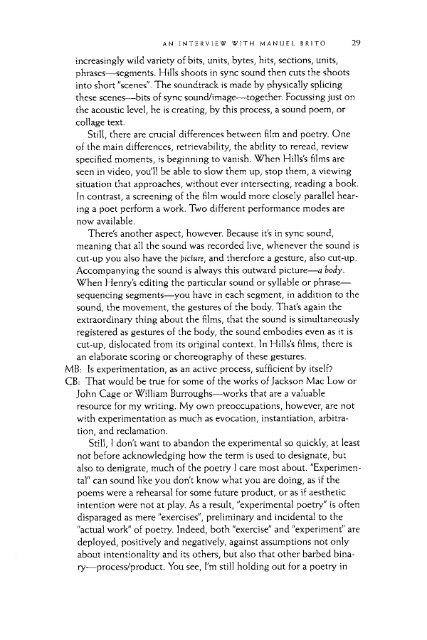My Way_ Speeches and Poems - Charles Bernstein
My Way_ Speeches and Poems - Charles Bernstein
My Way_ Speeches and Poems - Charles Bernstein
Create successful ePaper yourself
Turn your PDF publications into a flip-book with our unique Google optimized e-Paper software.
A N IN T E RV lEW WIT H MAN U E L B R ITO 29<br />
increasingly wild variety of bits, units, bytes, hits, sections, units,<br />
phrases-segments. Hills shoots in sync sound then cuts the shoots<br />
into short "scenes". The soundtrack is made by physically splicing<br />
these scenes-bits of sync sound/image-together. Focussing just on<br />
the acoustic level, he is creating, by this process, a sound poem, or<br />
collage text.<br />
Still, there are crucial differences between film <strong>and</strong> poetry. One<br />
of the main differences, retrievability, the ability to reread, review<br />
specified moments, is beginning to vanish. When Hills's films are<br />
seen in video, you'll be able to slow them up, stop them, a viewing<br />
situation that approaches, without ever intersecting, reading a book.<br />
In contrast, a screening of the film would more closely parallel hearing<br />
a poet perform a work. Two different performance modes are<br />
now available.<br />
There's another aspect, however. Because it's in sync sound,<br />
meaning that all the sound was recorded live, whenever the sound is<br />
cut-up you also have the picture, <strong>and</strong> therefore a gesture, also cut-up.<br />
Accompanying the sound is always this outward picture-a body.<br />
When Henry's editing the particular sound or syllable or phrasesequencing<br />
segments-you have in each segment, in addition to the<br />
sound, the movement, the gestures of the body. That's again the<br />
extraordinary thing about the films, that the sound is simultaneously<br />
registered as gestures of the body, the sound embodies even as it is<br />
cut-up, dislocated from its original context. In Hills's films, there is<br />
an elaborate scoring or choreography of these gestures.<br />
MB: Is experimentation, as an active process, sufficient by itself?<br />
CB: That would be true for some of the works of Jackson Mac Low or<br />
John Cage or William Burroughs-works that are a valuable<br />
resource for my writing. <strong>My</strong> own preoccupations, however, are not<br />
with experimentation as much as evocation, instantiation, arbitration,<br />
<strong>and</strong> reclamation.<br />
Still, I don't want to ab<strong>and</strong>on the experimental so quickly, at least<br />
not before acknowledging how the term is used to designate, but<br />
also to denigrate, much of the poetry I care most about. "Experimental"<br />
can sound like you don't know what you are dOing, as if the<br />
poems were a rehearsal for some future product, or as if aesthetic<br />
intention were not at play. As a result, "experimental poetry" is often<br />
disparaged as mere "exercises", preliminary <strong>and</strong> incidental to the<br />
"actual work" of poetry. Indeed, both "exercise" <strong>and</strong> "experiment" are<br />
deployed, positively <strong>and</strong> negatively, against assumptions not only<br />
about intentionality <strong>and</strong> its others, but also that other barbed binary-process/product.<br />
You see, I'm still holding out for a poetry in


